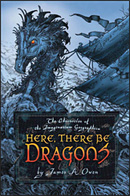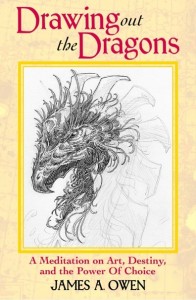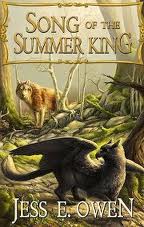 A guest post by James A. Owen
A guest post by James A. Owen
Everyone in the world seems to spend a lot of time trying to discern signals in the noise, to find the elusive patterns that will somehow light the way towards an easily attained success – but the truth is that everything is signal, and the only patterns that exist are those we trace with our passing. Our choices form the patterns, and it’s only in hindsight that we can see them. The important thing to remember is that circumstances change; this is why patterns cannot be replicated. The only thing we can do is make choices as wisely as we can and then adhere to them – and the most important choice you can make is to never sacrifice what you want the most for what you want most at that moment. Doing that creates the only kind of pattern worth following: a straight line. If you follow that, then the world will intersect with you in the ways that resonate with your choices, and not the other way around.
Those intersecting moments are synchronicity; the flashes of insight, inspiration, and opportunity that tell you you are on the right path – but it only works if you do not waver in your choices. 
Two years ago, an animation producer offered me a $250,000 investment in the HERE, THERE BE DRAGONS IP to jumpstart the development phase of the movie. We’d already had a dry run developing it at Warner Brothers with HARRY POTTER producer David Heyman and BATMAN BEGINS screenwriter David Goyer, who was overseeing my script, but they were occupied with other projects at the time, so it proved to be a nonstarter. Several years later, I’d regained the film rights and was working on it with Rick Porras and Marc Ordesky, two producers from THE LORD OF THE RINGS. Rick had introduced me to a screenwriter, and we’d assembled a great presentation, including preproduction sample art from ILM, but the high pricetag on the movie (estimated at $150 million to $175 million – ships on water are costly) was proving daunting to the studios, so we decided we needed to do more development first – and that takes money.
The offer could not have come at a better time for the project, and for me personally – after costs (paying the lawyers) and paying the screenwriter and other associated stuff, I would have netted about 40% of that. What made that money essential was that I was at the time coming down with a bad case of pneumonia that would linger for months – forcing the cancellation of the book tour for my fifth Imaginarium Geographica book, and seriously delaying completion of the sixth.
After difficult and protracted negotiations which stretched from August into December, we reached an agreement in which she and her backers would get a 25% stake in the IP, plus a return on their money, plus producer’s fees. A great deal for them, and a bearable one for me. But then we found out they wouldn’t be ready to fund until January – and I had to tell her if I didn’t have $50k by mid-December, I would lose my house. It had been a difficult season for a lot of people, and my own mother had come within days of losing her house. An error in transferring my mortgage between banks turned into a huge and expensive debt – one I couldn’t pay without that money. The investor said – around December 6 – that she might be able to arrange it.
By December 9, she said they can advance the money I needed immediately, on signing of a deal memo – AND on my assignment to her of all animation rights in the IP.
I agreed.
Around December 12, she told me her backers also wanted the publishing rights, too. I asked to exclude the current books, planned sequels, and spinoff titles. She agreed.
On December 14, I received the deal memo with only hours left to receive a wire to save my house. It included publishing rights to the excluded list of books. Furthermore, ALL rights to the IP would be transferred to a jointly-owned LLC while the other negotiations were conducted, during which NO other money would change hands.
I declined to sign. And she vanished from my radar without asking after my house.One immediate positive aspect of this was the effect it had on producer Mark Ordesky, who called up his attorney (also mine) and said, “I don’t know five people in Hollywood who would have made that choice.” Prior to this event, he had been on the periphery, but now he was decidedly involved in whatever I could make happen before I went broke.
Somehow, I managed to talk the bank into holding off on the foreclosure sale, in part by suggesting that I could 1) actually hold a press conference about it; and 2) make them look really bad for doing that sale right before Christmas. They agreed, and ended up announcing a moratorium on ALL of their foreclosure sales until after Christmas.

That spring, I decided I needed to somehow replace the six figure income I lost from the investment deal, so I could pay my bills and possibly fund the movie development myself. I had a Book Babe transcribe a recording of the library presentation I’d been doing for a few years, which I edited and expanded into DRAWING OUT THE DRAGONS: A Meditation on Art, Destiny, and The Power Of Choice. I released it as an ebook, and started selling well – REALLY well.
A number of readers wanted to have print copies so they could give DotD as Christmas and graduation presents, so I started a Kickstarter fundraiser to get the money. We overfunded, raising 130% of the amount we needed.
Around the same time, I googled the animation producer’s name and found out she and her backers had been censured by a federal judge for selling unregistered securities, and for fraudulently selling stakes in companies based on ownership of IP’s that they did not fully control. Had I agreed to the earlier deal, I would have either seen my biggest works tied up in a legal morass indefinitely; or seen my work used as a lever to bilk investors out of their money.
One of the Kickstarter backers was one of the people in charge of the venerable LTUE Symposium held for thirty years at BYU, and she invited me to be their next guest of honor.
The DotD books came out just prior to Christmas and started selling well, and more, garnering stellar reviews.
I went to LTUE in February 2012, and delivered a keynote address – DRAWING OUT THE DRAGONS – which got me a long, long standing ovation from an audience of 400 people. I was mobbed the rest of the day.
That night at the group signing, a woman waited at the end of my line for three hours in order to tell me the keynote was the most amazing thing she’d ever heard, and that she’s the acquisitions editor at a fine publishing house, and she gave me her card, and said if I ever want to do ANYTHING with them, the door was wide open.
Three months later, after I, in my Merchant Prince mode, conducted a serious courtship campaign, she and her boss, the publisher, flew to Arizona to convince me to do business with them.
Negotiations ensued. A contract was proffered. Negotiating the details took longer than we planned – but still, were going extraordinarily well.
In July, on the drive back from a family vacation, we found that the bank had finally ceased all foreclosure actions on my house and granted a loan modification.
Further negotiations occurred.
And, as of last Friday, the publisher and I finally agreed on the last terms of a deal comprising a total of eight books under two of the largest contracts I have ever signed in my career.
One contract is for a fiction series, the other, for a nonfiction series. Multimedia and film development on the former is already underway under the supervision of the same team I’d assembled to work on HERE, THERE BE DRAGONS – only this time, I hold all the rights to everything, because we’re funding the development ourselves.
If I had said yes to that investment deal two years ago, I would have spent the entirety of the front money saving my house – which I may have ended up losing anyway, because no other money would have been forthcoming due to the true nature of the backers making the offer. Instead, I would have given up most of my publishing rights in my most successful series, the animation rights, a chunk of all the REST of the rights, and more, tied myself as a partner to people who were about to get shut down by a federal court.
Because I DIDN’T say yes to what seemed a sure thing and reasonably easy money, I had to find another way to raise funds, and it was by sharing my own story. Because I did that, it became a book; because of the book, I was invited to speak at LTUE; because of that keynote address, I met an editor who has changed my future. And because of that meeting, I can now see the straight line stretching away ahead of me as clearly as I can see the one behind me.
All of the details of these projects will be announced later this week. I’m sharing it here, publicly and among readers who are my peers, first – along with one more secret: the first book published under this deal is going to be released in a new nationally-distributed mass market hardcover two days after the one year anniversary of my keynote address, and two days before the next LTUE Symposium. Sometimes the synchronicity you find is the synchronicity that you create for yourself.
The struggle turned into prosperity, because my choices never wavered. That’s how my synchronicity works. There’s no elusive pattern that creates success; it’s the benefit of following a straight line. Everything important to YOU is your signal. The rest is signal for someone else. Follow your signal. Trust your judgement. Hold firm to the choices you believe in.That’s how it works.
James A. Owen is the author of the Chronicles of the
Imaginarium Geographica series, the creator of the critically acclaimed Starchild graphic novel series, and the author of the Mythworld series of novels. He is also founder and executive director of Coppervale International, a comic book company that also publishes magazines and develops and produces television and film projects. He lives in Arizona. Visit him at
HereThereBeDragons.net Stay tuned for a follow-up post by James A. Owen regarding the hinted-at projects. Something exciting is in the works.


 A guest post by James A. Owen
A guest post by James A. Owen


